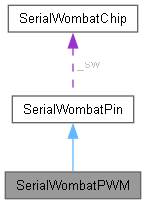A class representing a Serial Wombat PWM output. More...
#include <SerialWombatPWM.h>


Public Member Functions | |
| SerialWombatPWM (SerialWombatChip &serialWombat) | |
| Constructor for SerialWombatPWM class. | |
| int16_t | begin (uint8_t pin, uint16_t dutyCycle=0, bool invert=false) |
| Initialize a pin that has been declared as PWM. | |
| void | writeDutyCycle (uint16_t dutyCycle) |
 Public Member Functions inherited from SerialWombatPin Public Member Functions inherited from SerialWombatPin | |
| SerialWombatPin (SerialWombatChip &serialWombatChip) | |
| Instantiates a Serial Wombat Pin. | |
| SerialWombatPin (SerialWombatChip &serialWombatChip, uint8_t pin) | |
| Instantiates a Serial Wombat Pin. | |
| uint16_t | readPublicData () |
| Read the 16 Bit public data associated with this pin. | |
| void | pinMode (uint8_t mode, bool pullDown=false, bool openDrain=false) |
| Set pin to INPUT or OUTPUT, with options for pull Ups and open Drain settings. | |
| void | digitalWrite (uint8_t val) |
| Set output pin High or Low. | |
| int | digitalRead () |
| Reads the state of the Pin. | |
| uint16_t | writePublicData (uint16_t value) |
| Write a 16 bit value to this pin. | |
| uint8_t | pin () |
| Returns the current SW pin number. Used primarily for virtual calls by derived classes. | |
| uint8_t | swPinModeNumber () |
| Returns the Mode number. Used primarily by derived classes to populate packet data. | |
| int16_t | initPacketNoResponse (uint8_t packetNumber, uint8_t param0=0x55, uint8_t param1=0x55, uint8_t param2=0x55, uint8_t param3=0x55, uint8_t param4=0x55) |
| int16_t | initPacketNoResponse (uint8_t packetNumber, uint16_t param0=0x55, uint8_t param1=0x55, uint8_t param2=0x55, uint8_t param3=0x55) |
| int16_t | initPacketNoResponse (uint8_t packetNumber, uint16_t param0, uint16_t param1, uint8_t param2=0x55) |
| int16_t | disable () |
| Disables the pin mode (if applicable) | |
| int16_t | enablePullup (bool enabled) |
| Enables the weak pull up on a pin. Implemented on SW18AB only. | |
| int16_t | enablePullDown (bool enabled) |
| Enables the weak pull down on a pin. Implemented on SW18AB only. | |
| int16_t | enableOpenDrain (bool enabled) |
| Enables open drain mode on a pin. Implemented on SW18AB only. | |
Additional Inherited Members | |
 Protected Attributes inherited from SerialWombatPin Protected Attributes inherited from SerialWombatPin | |
| uint8_t | _pin = 255 |
| SerialWombatChip & | _sw |
| uint8_t | _pinMode = 0 |
Detailed Description
A class representing a Serial Wombat PWM output.
An instance of this class should be declared for each pin to be used as a Serial Wombat PWM.
SW4A / SW4B PWMs are initialized to a frequency of 31250 Hz at startup. This frequency can be changed using the setFrequency_SW4AB method. All PWM outputs use the same clock divider, so a change in frequency to one PWM output will affect other outputs.
SW4A/4B PWM inputs are either 8 or 10 bit resolution, depending on frequency selection. The duty cycle parameter of methods that set duty cycle take a 16 bit value ranging from 0 to 65535 as an input regardless of resolution, with 0 being always low, and 65535 being always high.
Serial Wombat 18AB PWM outputs are driven either by hardware peripherals or by a DMA based software PWM scheme. Up to 6 hardware PWM outputs are avaialble on Enhanced Digital Performance pins (0-4,7,9-19). The first six Enhanced Digitial Performance pins configured after reset will claim hardware resources. Any additional pins configured for PWM will use DMA based output. Hardware capable pins can generate high resolution signals up to about 100kHz. DMA based output is limited to transitions every 17uS, so a 1kHz output will have about 6 bits of resolution and a 100 Hz output will have about 9 bit resolution.
Definition at line 80 of file SerialWombatPWM.h.
Constructor & Destructor Documentation
◆ SerialWombatPWM()
|
inline |
Constructor for SerialWombatPWM class.
- Parameters
-
serialWombat SerialWombat chip on which the PWM will run
Definition at line 87 of file SerialWombatPWM.h.
Member Function Documentation
◆ begin()
|
inline |
Initialize a pin that has been declared as PWM.
- Parameters
-
pin The pin to become a PWM. Valid values for SW4A: 0-3 SW4B: 1-3 dutyCycle A value from 0 to 65535 representing duty cycle invert if true, internally adjust duty cycle to 65535-duty cycle
Definition at line 95 of file SerialWombatPWM.h.
◆ writeDutyCycle()
|
inline |
Definition at line 110 of file SerialWombatPWM.h.
Generated by